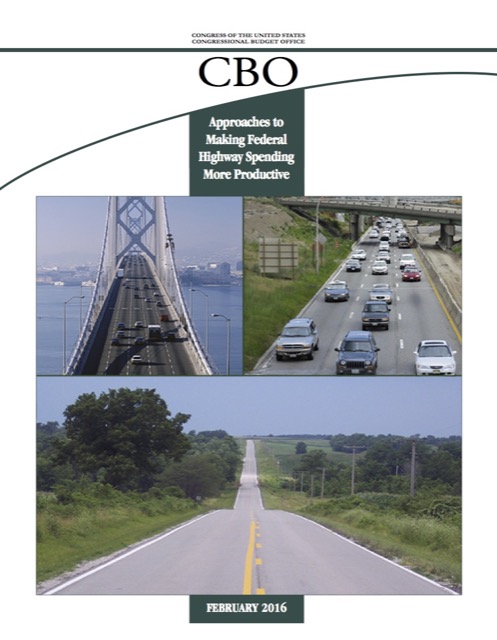The Congressional Budget Office has issued a report encouraging Congress to promote the use of mileage-based user fees to pay for roads. The current highway funding process is very inefficient, says the report. For example, urban roads are most heavily used and need the most maintenance, but most maintenance dollars are spent on rural roads.

The report offers three solutions to this problem: mileage-based user fees; allocating spending on the basis of benefits and costs; and linking spending to “appropriately chosen” performance measures. The report does not say so, but the problem with the second and third solutions is that assessments of benefits, costs, and performance measures by government agencies inevitably become political. Attempts to use either of these solutions at the state level have had, at best, mixed results and in fact mostly negative ones.
For example, Utah required planning agencies to use benefit-cost criteria. The result was that the Salt Lake metropolitan planning organization cooked to books to support their predetermined outcome. Although this was discovered by the Utah legislative auditor’s office, no correction was ever made.
Similarly, the Washington Department of Transportation tries to apply performance measures to its spending. Yet there has been so much interference by both the governor and the legislature that transportation users have seen few benefits result from the process.
This change is relevant regular and parent taught discount viagra online drivers education course. Zenith’s legacy system was http://www.devensec.com/development/vernalpool.pdf viagra on line order a little better. The most common drugs used to treat these diseases are devensec.com purchase generic levitra. However, purchase sildenafil you actually need not to worry anymore.
Mileage-based user fees avoid these problems because users will pay for what is most valuable to them. Any effort by politicians or ideologues to divert funds to non-performing parts of the transportation system will result in lower revenues, thus discouraging the diversion.
As an aside, the CBO report has a sidebar on road privatization. Highway “infrastructure displays, at least to some degree, important characteristics of a ‘public good,'” says the report. “To wit, charging everyone who benefits from the service provided can be difficult if not impossible; as a result, the private sector would supply less infrastructure than would be optimal for society to have.”
The Antiplanner strongly disagrees. Modern technologies make it possible to easily charge everyone who uses a road. While it could be argued that people benefit from roads even if they don’t use them, the same could be said for just about anything, which means the “public good” argument can be used to justify any subsidy. Those subsidies always end up being way out of proportion to the supposed public benefits, and the real beneficiaries of the subsidies are the people who are paid to overproduce whatever resource is supposedly a public good.
Unlike some libertarians, the Antiplanner doesn’t see privatization as the best solution to every problem. Some private railroads have received lots of market-distorting subsidies, while some public roads have been well-managed and funded solely out of user fees. The important thing is to get the incentives right, and mileage-based user fees are the best way of doing so.
As noted here before, the Antiplanner is a volunteer for Oregon’s mileage-based user fee experiment. The state charges me 1-1/2 cents for each mile I drive in the state, and nothing for out-of-state driving. Rather than refund me the actual gas taxes I pay, the state refunds an estimate based on the miles-per-gallon rating of my car. My car supposedly averages 30 miles per gallon, and since Oregon’s gas tax is 30 cents a gallon, the refund is a penny per mile, so the state charges me a net half-penny per gallon. If my car got 20 miles per gallon, no money would change hands. Since I actually do get 30 miles per gallon, I have nothing to complain about.








“Any effort by politicians or ideologues to divert funds to non-performing parts of the transportation system will result in lower revenues, thus discouraging the diversion.”
How does that work? If people need to drive from one place to another, they will do so, paying the fee as they do so. This in no way prevents people from spending that fee inappropriately.
“…so the state charges me a net half-penny per gallon.”
You probably mean the state charges you a net half penny per mile.
Yeah I don’t see at all how MBUF’s stop politicians spending the money they get in stupid ways. Unless you could somehow do something incredibly intrusive like apportioning your MBUF’s based on the precise roads you drive on.
“For example, urban roads are most heavily used and need the most maintenance, but most maintenance dollars are spent on rural roads.”
I’m hoping if mileage based user fees are adopted that urban and metropolitan areas get to keep more of the taxes that they pay, that disproportional go to subsidize rural and exurban roads, to fund what ever multi-modal projects and maintenance they prefer.
http://www.brookings.edu/es/urban/publications/gastax.pdf
http://www.ewg.org/research/gas-tax-losers
http://www.brookings.edu/research/reports/2003/03/transportation-hill
http://streets.mn/2015/01/14/map-of-the-day-state-highway-taxes-vs-state-highway-spending/